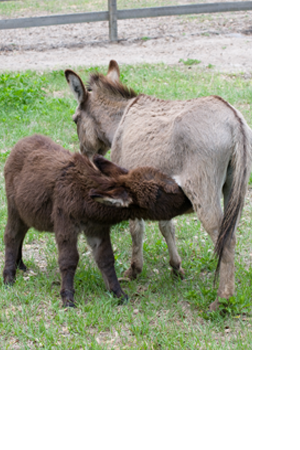Miniature Donkeys
 Origination
and Characteristics
Origination
and Characteristics
Miniature donkeys are native to the Mediterranean islands of Sicily and Sardinia. They are identified as either Sicilian or Sardinian donkeys according to their ancestry, although the two types do not differ. They have been extensively bred with each other and with animals of unidentified ancestry in the United States to produce a distinctively American breed of donkeys, which we call the Miniature Mediterranean Donkey. According to all information that can be acquired these donkeys are nearly extinct in the land of their origin and have been brought to their current state of being an excellent breed by breeders in the United States who have bred for years for size, disposition and conformation.
The friendliest and most affectionate of its type...
The Miniature Donkey is by nature one of the friendliest and most affectionate animals of its type. They are very tame and gentle. They are also easier to manage in everyday life than some donkeys simply because they are smaller. They love their owners and seek attention. They do this with friendly nudges and brays and funny little sounds designed to get you to pay attention to them. The miniature donkey is extremely intelligent and docile and is easily trained. Geldings or jennets make the best pets. Jacks enjoy braying and may become excited in the presence of the females.
The size of these donkeys varies from 26 inches, which is considered extraordinarily small, to 36 inches at the withers. An average height would be about 33-34 inches. In general the smaller the donkey the more valuable it is accounted to be. Other things that make a donkey valuable are good body and leg conformation and one of the more unusual colors such as spotted, white, sorrel, "chocolate" (dark brown) or black. Gray-dun, the various shades of gray with the dorsal stripe and cross is the most common color of these donkeys.
Life expectancy for well cared for miniature donkeys is around 30-35 years so they are truly a lifetime pet.
A Few Safety Tips to Remember
Responsibilities
- Make arrangements to have a veterinarian you can call on whenever needed — ask if they can provide emergency care. Invite them over soon after you bring your Miniature Donkeys home . . . this way the vet will see how your Donkeys look and act when they are feeling well and the visit will also allow the vet to learn how to get to your farm quickly if needed. There really is nothing like a good preliminary visit with your veterinarian — whether on your farm or in his office — to put your mind at ease about the healthy future of your Miniature Donkeys.
- Never leave a halter on your Donkeys due to the danger of hanging.
- Check your pasture for any toxic plants (your Cooperative Extension Service is a great source for identifying these troublemakers).
- Start working with your Donkeys on basic halter training.
- Learn how to take your Donkey's temperature.
- Be aware of any changes in your animal's behavior, eating, drinking or manure. There are many good references that can help you learn more about your Donkey.
Size of Donkey
Donkeys come in a variety of sizes from the Miniature Mediterranean (under 36 inches) to the elegant Mammoth Jackstock (14 hands and up ). The rare French Poitou donkey, characterized by it's huge head and ears, and very thick, shaggy, curled black coat, can stand 14 to 15 hand high. (There are estimated to be about 400 purebred Poitous left in the world today.)
The types of donkeys are labeled by their sizes;
36" and under, Miniature Mediterranean
36.01-48", Standard
48.01" to 54" (jennets) or 56"; (jacks), Large Standard
54/56" and over, Mammoth Stock
Colors of Donkeys
Donkeys come in a variety of colors. The most prevalent color for Miniature Donkeys is gray-dun which consists of a gray colored body, light colored nose - or dark colored nose -, light colored belly and inside legs, with a dark color dorsal stripe down the back and over the shoulders. The dorsal stripe is known as the donkeys cross. There are variations of this gray-dun from dark to light. Donkeys can range in color from black to white and everything in between. True blacks are rare with black/browns (not quite black) being more common. There are chestnut/sorrels which are various shades of reddish brown. There are also white donkeys and "spotted" donkeys. Some people refer to spotted as "pinto", "piebald" or "skewbald" and this really boils down to semantics. Spotted donkeys are generally gray, black or brown and white. There are also various colors of roans. Roan coloring is black, brown, gray hairs intermingled with white hairs. Donkeys do not breed true to color. Since gray-dun is by far the predominant gene, you can breed black to black and get gray-dun, spotted to spotted and get gray-dun, etc. Colors other than the typical gray-dun makes the donkey more exotic looking therefore increases their price.
© 2011-2021


